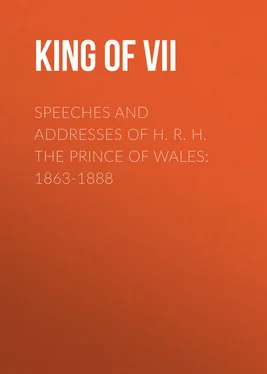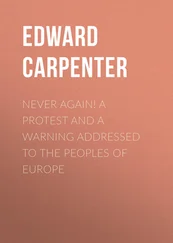Edward VII - Speeches and Addresses of H. R. H. the Prince of Wales - 1863-1888
Здесь есть возможность читать онлайн «Edward VII - Speeches and Addresses of H. R. H. the Prince of Wales - 1863-1888» — ознакомительный отрывок электронной книги совершенно бесплатно, а после прочтения отрывка купить полную версию. В некоторых случаях можно слушать аудио, скачать через торрент в формате fb2 и присутствует краткое содержание. Жанр: История, История, foreign_antique, foreign_prose, на английском языке. Описание произведения, (предисловие) а так же отзывы посетителей доступны на портале библиотеки ЛибКат.
- Название:Speeches and Addresses of H. R. H. the Prince of Wales: 1863-1888
- Автор:
- Жанр:
- Год:неизвестен
- ISBN:нет данных
- Рейтинг книги:3 / 5. Голосов: 1
-
Избранное:Добавить в избранное
- Отзывы:
-
Ваша оценка:
- 60
- 1
- 2
- 3
- 4
- 5
Speeches and Addresses of H. R. H. the Prince of Wales: 1863-1888: краткое содержание, описание и аннотация
Предлагаем к чтению аннотацию, описание, краткое содержание или предисловие (зависит от того, что написал сам автор книги «Speeches and Addresses of H. R. H. the Prince of Wales: 1863-1888»). Если вы не нашли необходимую информацию о книге — напишите в комментариях, мы постараемся отыскать её.
Speeches and Addresses of H. R. H. the Prince of Wales: 1863-1888 — читать онлайн ознакомительный отрывок
Ниже представлен текст книги, разбитый по страницам. Система сохранения места последней прочитанной страницы, позволяет с удобством читать онлайн бесплатно книгу «Speeches and Addresses of H. R. H. the Prince of Wales: 1863-1888», без необходимости каждый раз заново искать на чём Вы остановились. Поставьте закладку, и сможете в любой момент перейти на страницу, на которой закончили чтение.
Интервал:
Закладка:
Captain M. J. O'Connell, in returning thanks for the Volunteers, remarked that in the London Irish there never had been any political or polemical disputes.
At this stage of the proceedings there occurred a scene thoroughly "racy of the soil" of which most of the noblemen and gentlemen present were natives. The children of the schools were brought into the room, and "St. Patrick's Day" having been struck up by the band, the boys and girls proceeded to make the circuit of the tables. The national air of Ireland told alike on the benefactors and the recipients of the charity. The children looked with glistening eyes on the company, and the latter, as the young ones passed by, loaded them with fruit and cakes to such an extent that before the juvenile procession had made its exit from the apartment the tables had been cleared of the entire dessert, which was a very liberal one. The boys and girls raised a loud cheer as they left the room, and the entire company, including the illustrious President, appeared all the happier for having made the festival the means of so unusual a treat for the little sons and daughters of poor Irish parents struggling for their living in London.
After the performance of a selection of Irish airs, the Prince of Wales again rose and said: —
"My Lords and Gentlemen. – The next toast which I shall have the honour of proposing to you is the toast of the evening. We are here to-night for a very excellent and charitable purpose. The objects of the Benevolent Society of St. Patrick have been so often stated – so many able speeches have been made at so many successive anniversaries of this festival, that there is very little left for me to say; but having accepted, which I did with pleasure, the post of chairman this evening, I feel it is due to the institution and to this company that I should make a few observations. I may as well at once say that I am about to call upon you to drink prosperity to the Benevolent Society of St. Patrick. This Society was instituted in 1784, with the object of relieving the necessitous children of Irish parents resident in London. One of its first patrons was my grandfather, the Duke of Kent. I have always understood that he took a very great interest in the Society, and I may further observe that several of my grand-uncles acted as presidents at your annual dinners. At the present moment I believe the schools are in what may be called a flourishing condition, They afford education to as many as 400 children. That the boys and girls are in good health and thriving is, I think, pretty evident, from the appearance they presented as they passed through the room just now. A special feature in the conduct of the schools is that no doctrinal teaching is permitted. They are entirely national and non-sectarian schools. At the same time the children are strongly advised to attend the instructions given by the ministers of the religion in which their parents wish them to be brought up, and they are afforded an opportunity of doing so every week. If it is thought desirable, the children are apprenticed on leaving school. This system has been found to work remarkably well. Inducements are held out for proficiency and good conduct by rewards given after examination. A comparatively new feature in the management of the institution is this – that at times when the parents are enduring hardships and perhaps privations owing to the want of work – when they may not have a sufficiency of daily bread for the maintenance of their families, as, for instance, during severe winter weather, when many poor people find it difficult to obtain employment – a daily meal is given to children who are in want of it. This has been found to afford much assistance to the parents as well as the children, and may therefore be regarded as a satisfactory addition to the arrangements of the managers. I am informed that of late years the institution has lost many valuable patrons and supporters, but I should hope that any void in this way may speedily be filled up. My Lords and Gentlemen, – though this may be called an annual festival in aid of a charity, and in this respect it is exceedingly useful, it has also another advantage. It has long been regarded as an occasion when Irishmen living in London may meet together without sectarian feelings or political allusions. Such meetings are beneficial, and they must be all the more so when their main object is the furtherance of a most excellent institution like the Benevolent Society of St. Patrick, prosperity to which I now ask you to drink."
The illustrious President next gave "The Lord-Lieutenant of Ireland," and in doing so said, "he was sure every one would agree with him in thinking that Lord Abercorn had filled his high office with credit to himself and benefit to the country. His Excellency had had a very arduous task to perform. During Lord Abercorn's administration there had been great troubles in Ireland, but it was to be hoped that these were almost at an end."
The Earl of Mayo, in returning thanks for the Lord-Lieutenant, expressed his opinion that the Prince of Wales on his forthcoming visit to Ireland would experience such a reception as would induce His Royal Highness to go there again.
The Earl of Kimberley, in proposing the health of the illustrious President, said he thought the friends of Ireland ought to feel much obliged to His Royal Highness for his presence there that evening. He was convinced that good would result from it. Having on one occasion, while filling the office of Lord-Lieutenant, had the honour to receive the Prince of Wales at Dublin, he could state from his own knowledge that His Royal Highness took the deepest interest in all that concerned the welfare of Ireland, and showed the greatest anxiety to make himself acquainted with her affairs. The Prince had made himself acquainted with her affairs, and was in a position to give an intelligent and a just opinion on the matter. This was of great importance for Ireland. He thought he might venture to say that the Prince of Wales felt an affection for Ireland.
The toast was drunk with all the honours, and with unusual enthusiasm. The Prince of Wales said: —
"I am exceedingly gratified by the very kind terms in which my noble friend has proposed my health, and the more than cordial manner in which you, my lords and gentlemen, have received it. I hope I need not assure you that it has been a source of great pleasure to me to take the chair at a dinner in aid of a society which does so much for the benefit of so many children of the poorer Irish in London. My noble friend has alluded to my approaching visit to Ireland. I shall only say that I am glad to visit a portion of the United Kingdom in which I have experienced such extensive kindness from all parties. I agree with the noble Lord the Chief Secretary for Ireland. If this visit should tend to give pleasure to the people of Ireland I hope there may be a longer visit hereafter. During the course of the last two years there has been much that has been disagreeable to loyal Irishmen; but I am convinced that the people of Ireland generally are thoroughly true and loyal, and that the disaffection which has existed will only be of short duration. It has not been engrafted on the minds of any portion of the Irish people by the Irish people themselves. But as we are assembled here for a purely charitable object this is not the place for political allusions. I shall, therefore, conclude by once more thanking you for the kind way in which you have drunk my health, and for the manner in which you have supported me this evening."
The amount contributed to the funds of the charity was about £1200, which included 100 guineas from the Queen, and a similar sum from the Prince of Wales.
DUBLIN AND CARNARVON
The projected visit to Ireland, referred to in a previous article on St. Patrick's festival, took place in April, 1868. It was a successful and memorable visit in every way. On the 15th of April the Prince and Princess of Wales, who had started from Holyhead at 4 A.M., arrived in Kingstown Harbour at 9.30, and landed amidst salutes from the fleet attending the Royal yacht. On the way to Dublin Castle they were received with enthusiasm by the crowds. The streets and houses were profusely decorated with banners and evergreens. "Welcome to Erin" was the burden of the mottoes. No troops lined the way, but reliance was put on the loyal and hospitable spirit of the people, who kept the track clear for the cortège, and when the escort had passed the crowd closed in behind, like the waters in the wake of a ship which has passed through. At night the city was brilliantly illuminated. Next day the royal party went to Punchestown races in open carriages, and were greeted with enthusiasm as great as on the first entrance to Dublin. On Saturday the Prince was installed, with great ceremony, a Knight of St. Patrick, in St. Patrick's Cathedral.
Читать дальшеИнтервал:
Закладка:
Похожие книги на «Speeches and Addresses of H. R. H. the Prince of Wales: 1863-1888»
Представляем Вашему вниманию похожие книги на «Speeches and Addresses of H. R. H. the Prince of Wales: 1863-1888» списком для выбора. Мы отобрали схожую по названию и смыслу литературу в надежде предоставить читателям больше вариантов отыскать новые, интересные, ещё непрочитанные произведения.
Обсуждение, отзывы о книге «Speeches and Addresses of H. R. H. the Prince of Wales: 1863-1888» и просто собственные мнения читателей. Оставьте ваши комментарии, напишите, что Вы думаете о произведении, его смысле или главных героях. Укажите что конкретно понравилось, а что нет, и почему Вы так считаете.












